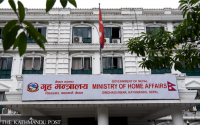National
China welcomes authentication of transitional justice bill
With the President’s authentication, the bill will come into force once it is published in the Gazette.
Post Report
Two days after President Ramchandra Paudel authenticated the bill to amend the Enforced Disappearances, Enquiry, Truth and Reconciliation Commission Act, northern neighbour China welcomed Nepal’s efforts to take the nearly two-decade-long peace process to a logical conclusion.
President Paudel validated the bill on August 29 under Article 113(2) of the Constitution of Nepal.
In a post on his social media platform, X, Chen Song, China's ambassador in Nepal, congratulated Nepal on the bill’s passage.
“Congrats on the Commission of Investigation on Enforced Disappeared Persons and the Truth and Reconciliation Commission Act (Third Amendment) Bill, 2081 BS, certified by President Ram Chandra Paudel. It marks a historic milestone in the peaceful process of Nepal based on all parties’ consensus. It’s time for all stakeholders to go ahead and embrace a brighter future for Nepal,” he said.
The United States of America, Switzerland, Australia, the United Kingdom, Norway, Japan, Finland, the European Union, Germany, and France welcomed the bill passed by both houses of the federal parliament on the same day the President authenticated the bill.
Ending nearly a decade of confusion, the House of Representatives passed the bill on August 14, followed by the validation from the National Assembly on August 22. It was forwarded to President Paudel after Speaker Devraj Ghimire certified it on Wednesday.
With the President’s authentication, the bill will come into force once it is published in the Gazette.
Along with some victim’s groups from the 1996-2006 insurgency, three international human rights organisations and the National Human Rights Commission expressed their reservations about some provisions of the bill.
The constitutional human rights watchdog is particularly unhappy with the provision of reducing 75 percent sentencing even for serious violations of human rights. It allows the attorney general to lodge the case demanding just 25 percent of action as per the existing law.
The peace process began with the signing of the Comprehensive Peace Accord in 2006 which ended the decade-long Maoist insurgency in the country.
Other tasks of the peace process including the integration of Maoist combatants and management of the arms of the former rebels were accomplished years ago but the responsibility to serve justice to the conflict victims remained unfinished.




 8.85°C Kathmandu
8.85°C Kathmandu













